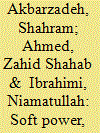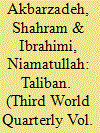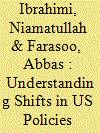|
|
|
Sort Order |
|
|
|
Items / Page
|
|
|
|
|
|
|
| Srl | Item |
| 1 |
ID:
175589


|
|
|
|
|
| Summary/Abstract |
The proliferation of jihadist groups raises intriguing questions about their internal relationship. Drawing on Resource Mobilization Theory we explore this question by examining the relationship between the Taliban and the local incarnations of the Islamic State of Iraq and Syrian (ISIS) in Afghanistan. We conceive the Taliban and ISIS as parts of a broader “jihadist movement industry” that is simultaneously united and divided by the logic of their embeddedness in the movement. While most existing research emphasizes intra-jihadist conflict or rivalry, we found that the relationship between the two groups goes through cyclical shifts, vacillating between conflict and cooperation.
|
|
|
|
|
|
|
|
|
|
|
|
|
|
|
|
| 2 |
ID:
187992


|
|
|
|
|
| Summary/Abstract |
How do rumors emerge and spread? One explanation emphasizes some form of crisis and uncertainty as the facilitating condition and another strand of research focuses on micro-level dynamics to explain how some groups are more vulnerable to rumors than others. This article applies framing theory to examine a rumor that led to violence that killed Farkhunda Malikzada in Afghanistan in March 2015 and three separate protests against the incident. Focusing on how different groups understand and reinterpret rumors, the article makes a distinction between rumor as an informational shortcut and an instrument of deliberate manipulation of information.
|
|
|
|
|
|
|
|
|
|
|
|
|
|
|
|
| 3 |
ID:
189523


|
|
|
|
|
| Summary/Abstract |
The concept of soft power was developed at the end of the Cold War to examine international influence through non-coercive means. In recent years, a growing field of research has drawn on this concept to examine the role of religion and culture in the foreign policies of Middle Eastern states. The existing research tends to view soft power from the perspectives of states that project such influence, not the impact of these policies on target societies, and tends to overlook the relationship between hard and soft power strategies. To address this gap, we draw on an original survey data and face-to-face interviews to evaluate Iran’s influence in Afghanistan. This study examines the response in Afghanistan to key pillars of Iranian soft power projection: the role of shared language and culture, religion and Tehran’s Third Worldist ideology of resistance against Western powers. This research finds that Iran’s soft power projection strategy is undermined by structural hard power imbalances between the two countries and Tehran’s contradictory policies towards Afghanistan.
|
|
|
|
|
|
|
|
|
|
|
|
|
|
|
|
| 4 |
ID:
171323


|
|
|
|
|
| Summary/Abstract |
Iran has pursued a highly contradictory policy towards Afghanistan. On the one hand, it became a significant beneficiary of the overthrow of the Taliban regime by the US-led military intervention in 2001 in Afghanistan. The new Afghan government established cordial ties with Iran, allowing it to expand its political, economic and cultural influence in the country. Yet Iran has also provided significant support to the Taliban in its campaign to violently upend the political, social and economic processes in the country. This article examines the underlying domestic and regional security dynamics that contribute to this contradictory behaviour. It offers an assessment of how tensions between the United States and the Islamic Republic, as well as Tehran’s growing threat perception following the rise of the Islamic State – Khorasan in 2014, impact on Iran’s policy towards the Taliban. The paper argues that Tehran views the Taliban as an instrument to disrupt the influence of other actors in Afghanistan. The instrumentalisation of the Taliban, however, is likely to be counterproductive for Iranian security in the long run as it contributes to Afghanistan’s instability and insecurity and undermines Iran’s own long-term interests.
|
|
|
|
|
|
|
|
|
|
|
|
|
|
|
|
| 5 |
ID:
188995


|
|
|
|
|
| Summary/Abstract |
The ‘war on terror’ produced discourses, which elevated terrorism as a primary threat to international peace and security and justified the overthrow of regimes that were suspected of supporting terrorism. After two decades, the United States (US) seeks to wind down the war, including through negotiations with groups that it once regarded as terrorist or complicit in terrorism. This article takes a critical approach to examine these shifts in US policy in relation to the Taliban in Afghanistan. It conceives the Taliban as a networked movement that consisted of local roots, transnational jihadist ties and connections to Pakistan’s proxy war in Afghanistan. The article then identifies and problematises key assumptions of American discourses by assessing them against local patterns of terrorism and (in)security and the Taliban’s violent tactics. Drawing on US sources, it finds that the US discourses shifted over time between various aspects of the Taliban movement as signifiers of its identity to justify shifting Washington’s priorities in Afghanistan. These discursive shifts, which reflected US policy priorities, introduced uncertainties and contradictions that contributed to the failure of the war efforts in Afghanistan.
|
|
|
|
|
|
|
|
|
|
|
|
|
|
|
|
|
|
|
|
|